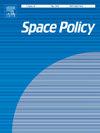接种恩克拉多斯
IF 2
4区 社会学
Q2 INTERNATIONAL RELATIONS
引用次数: 0
摘要
在太阳系中发现了能够支持已知生命类型的环境,这就提出了一个问题,即是否可以故意将它们接种,以研究生物圈出现的过程。我们讨论了土卫二的情况,这是第一个令人信服地证明具有当今可居住性的所有要求的行星体,并考虑了接种将实现的方法。我们提出了一些可能被研究的科学问题的例子。可以进行的令人信服的科学研究表明,可居住的世界将如何产生新的伦理问题。由于我们可能无法确定它们是否处于无人居住的状态,我们必须决定是否原则上反对任何接种实验,或者是否对它们的无人居住状态有一定程度的信心,通过适当的采样方案确定,将允许接种。由于地外海洋的孕育会引起行星规模的变化,可能会在更短的时间内完成,例如,对火星等行星进行更投机的地球化改造,因此科学上的可能性及其随之而来的伦理挑战可能是近期的挑战。本文章由计算机程序翻译,如有差异,请以英文原文为准。
Inoculating Enceladus
The discovery of environments in the Solar System that possess conditions capable of supporting known types of life raises the question of whether they could be deliberately inoculated in order to study the process of the emergence of biospheres. We discuss the case of Enceladus, the first planetary body to convincingly be shown to possess all the requirements for habitability in the present-day, and consider ways in which inoculation would be achieved. We present examples of the scientific questions that might be investigated. The compelling science that could be done shows how habitable worlds will create new ethical questions. As we might not have certainty on their status as being uninhabited, we would have to decide on a principled objection to any inoculation experiments or whether some level of confidence in their status as being uninhabited, determined by a suitable sampling regimen, would allow for inoculation. As the inoculation of extraterrestrial oceans, causing planetary scale changes, might be accomplished in a far shorter time scale than, for example, the more speculative terraforming of a planet such as Mars, the scientific possibilities and their attendant ethical challenges potentially represent a near-term challenge.
求助全文
通过发布文献求助,成功后即可免费获取论文全文。
去求助
来源期刊

Space Policy
Multiple-
CiteScore
3.40
自引率
36.40%
发文量
40
期刊介绍:
Space Policy is an international, interdisciplinary journal which draws on the fields of international relations, economics, history, aerospace studies, security studies, development studies, political science and ethics to provide discussion and analysis of space activities in their political, economic, industrial, legal, cultural and social contexts. Alongside full-length papers, which are subject to a double-blind peer review system, the journal publishes opinion pieces, case studies and short reports and, in so doing, it aims to provide a forum for the exchange of ideas and opinions and a means by which authors can alert policy makers and international organizations to their views. Space Policy is also a journal of record, reproducing, in whole or part, official documents such as treaties, space agency plans or government reports relevant to the space community. Views expressed in the journal are not necessarily those of the editors or members of the editorial board.
 求助内容:
求助内容: 应助结果提醒方式:
应助结果提醒方式:


